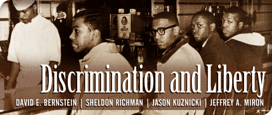David Bernstein remains unconvinced that a massive nonviolent direct-action movement could have broken the Southern white-supremacist business cartel without Title II. We’ll never know, of course. But we do know that incredible progress was being made. Yes, the national department-store chains, such as Woolworth’s, were desegregating their lunch counters under pressure from the student sit-in movement in part because of sympathy boycotts in the North. But this only goes to show the power of the movement. We don’t know how things would have played out had Title II not been passed. But it is reasonable to believe progress would have continued precisely because of sympathy outside the South. (My original reply noted the successful boycott of the gas-station chains in the 1950s.)
Professor Bernstein points out that the freedom-rider movement, which aimed at ensuring desegregation of interstate bus facilities, met with white violence. True enough. But each incident only brought out more freedom riders, black and white. This movement was not to be stopped. Professor Bernstein writes, “Admittedly, lodging authority with the federal government potentially creates its own problems. But I think it’s even more problematic to expect social activists to risk life and limb to overturn an unjust system.” I really don’t understand this final statement. Social activists—increasing in number all the time—were risking life and limb, and were succeeding. The whole world was watching.
I will agree that as long as government was taxing people (allegedly) to provide for their protection, it should have protected them from violence. And since the violence was condoned (if not actually abetted) by state and local authorities in the South, the federal government should have provided protection. That, however, is different from Title II.
My earlier reply lamented the turn from direct social activism to lobbying and legislation because it constituted 1) preemption by a patronizing white political establishment and 2) reinforcement of the idea that the State can right all wrongs. As to the first, some civil-rights activists expressed the same view. Freedom Rider C. T. Vivian said, “What these liberal white fellows were saying [to the social movement] is that the non-liberals down here are gonna kill you … and we won’t be able to help you…. And without our help, why, you could never make it, because you must have us talking to white people. And we were saying, that’s your importance, all right, but you haven’t freed nobody.”
Professor Bernstein writes in his rebuttal, “I would say that the correlation between Title II and other forms of property regulation is tenuous at best; to the extent it exists, though, it’s because supporters of such regulation have gotten away with characterizing Title II as a run-of-the-mill regulation of property, when it is to a large extent a vindication of the original common law property system that was distorted by racist judges and legislators.”
The correlation doesn’t seem tenuous to me. Most people—given their attitude toward the State—do not make the distinctions libertarians make. It was inevitable that Title II would be just the beginning of the social engineering Professor Bernstein properly abhors. Sure, supporters “got away with characterizing Title II as a run-of-the-mill regulation of property.” But who was in any position to prevent that? For most people, toothpaste is toothpaste—and it was out of the tube.
Professor Bernstein raises a good question when he asks, “to what extent would the Voting Rights Act, passed in 1965, have broken the southern racist cartel without the additional interventions of the 1964 Act?” It seems to me it would have helped. The threat to vote out a mayor or sheriff certainly couldn’t have hurt. One of the earliest triumphs of the lunch counter sit-in movement was in Nashville, a city in which blacks could vote.

